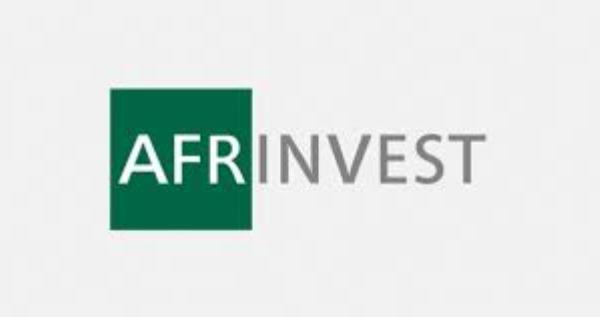E-Financial
Afrinvest Affirms Nigerian Banks as Resilient Despite Economic Downturn

The 2022 Afrinvest Banking Sector Report has revealed that despite daunting economic challenges, commercial banks in the country recorded modest improvement in all regulatory indicators.

The report, presented by Mr. Victor Ndukauba, Deputy Group Managing Director, Afrinvest West Africa, showed that the banks beat all the prudential guideline limits set by the Central Bank of Nigeria (CBN), demonstrating their resilience and strength during the year.
The report, which was launched at a ceremony to unveil Optimus, Afrinvest’s digital investment app, in Lagos, is the 17th edition of the Nigerian Banking Sector Report.
The occasion also marked the announcement of Afrinvest’s new subsidiaries and expansion of its leadership team as well as the unveiling of Afrinvest’s refreshed logo
The report’s assessment of CBN’s financial stability indicators showed that Industry Liquidity (Liquidity Ratio) and Non-Performing Loan ratios both improved by 130 basis points (up) and 75bps(down), respectively, to 42.6 per cent and 4.95 per cent.
Although, the Capital Adequacy Ratio (CAR: 14.1 per cent) underperformed the June 2021 level by 140bps, all the indicators beat the prudential guideline limits of 30 per cent (LR), five per cent(NPLs), and 13.0 per cent(CAR), respectively, despite myriads of challenges in the business environment.
The report said the improvement is expected to be sustained over the coming years.
It explained that the fiscal challenges presented by weak Federal Government earnings have contributed to the muddling of monetary policy and strong use of Cash Reserve Ratio debits as a subtle strategy, in our view, to compensate for the inflationary effect of ballooned overdraft to the government.
It insists that in increasing its developmental financing role, especially in agriculture financing, the CBN risks crowding out banks and private sector financing, which is more effective in de-risking the sector and incentivising growth without moral hazards.
“Importantly, the weak economic growth has robbed banks of the dividend of large and youthful demographics. Over the last 10 years to 2021, real Gross Domestic Product has grown by a compound annual growth rate (CAGR) of
In line with the decline in income level, poverty has risen to 40.1 per cent based on national standards of annual real per capita expenditure threshold of N137,430.
“For banks, this reality means that upscaling would be less efficient than in an economy where growth exceeds population expansion. Not surprising, Nigeria’s financial depth is weak as is for countries with high fertility rates and a fragile economic base.,” it said
“Some other measures advised include the tapering of fiscal deficit financing – credit to the government – to check money supply expansion, alignment of rates across windows and the adoption of market reflective forex rate via the crawling peg regime.
“We believe that the outcome for banks in the coming decade would rely on the policy actions taken today to address the issues raised,” it said.
On exchange rate management, the report said CBN’s strategy (differentiated rates across market segments and capital control) failed the litmus test over the reviewed period, as anticipated in the 2021 report.
It said the value of the Naira depreciated further by 5.6 per cent and 23.2 per cent to N436.50/$1.00 and N712.00$1.00 (on 19/09/2022) at the NAFEX window and parallel market, respectively.
“It sated that near-term improvement in the exchange rate is not in sight, given forex supply constraints due to the self-inflicted injuries in Nigeria’s oil & gas sector (the largest source of FX accretion).
On the economy, the report said that in 2021, the Nigerian economy recovered markedly from the pandemic-induced strain of the prior year.
“Real Gross Domestic Product (GDP) grew 3.4 per cent (2020: -1.9 per cent), beating our projection by 0.4ppts. The recovery was mainly driven by the expansion of activities in the non-oil sector (up 4.4 per cent), while the oil sector remained in a recession.
“This growth momentum was sustained into 2022 albeit with a wider divergence between the oil and non-oil sectors.,” it said.
The report stated that, given the resilient half-year 2022 performance and expectation of sustained positive performance by key non-oil activity sectors in third and fourth quarters of the year, it reviewed the 2022 baseline growth forecast upward by 40bps to 3.3 per cent.
However, it maintained that growth momentum in the medium term would remain short of the level that can meaningfully lift the average well-being of the citizenry due to persistent domestic and external headwinds.
It said oil price level, domestic inflation rate has remained persistently high, averaging 14.3 per cent in the last six years.
E-Financial
Flutterwave Rises from Lagos Startup to Africa’s Fintech Powerhouse

Flutterwave has transformed from a modest Lagos venture into one of Africa’s most valuable fintech firms, processing billions in transactions yearly across 30+ countries and 150+ currencies.

Flutterwave
Founded in 2016 by Iyinoluwa Aboyeji, Olugbenga “GB” Agboola, and Adeleke Adekoya, it tackled Africa’s fragmented payments—siloed banks, mobile money gaps, and unreliable cross-border flows—with a unified API for seamless collections, payouts, and settlements.
Founding Vision
The trio spotted the pain: Aboyeji’s Andela faced border delays; Agboola drew from PayPal/Google; Adekoya handled compliance. Early wins included Uber Nigeria payouts from a Lekki co-working space, proving scalability amid lean ops.
Growth Milestones
2017–2020: $10M seed/Series A fueled West Africa push; Agboola took CEO helm post-Aboyeji; COVID boosted e-commerce volumes.
2021–2022: Unicorn at $1B+ (Series C, $170M); $3B+ valuation (Series D, $250M); partnerships with Microsoft, Uber; Send App for US diaspora.
2025–2026: Profitability focus yields better margins; 34 US licenses; Mono acquisition ($25–40M) bolsters open banking.
Challenges Overcome
Regulatory hurdles hit: Kenya 2022 freeze (cleared); Nigeria fraud claims (resolved, controls enhanced); culture probes led to reforms with ex-Mastercard/Stripe hires. These underscore multi-jurisdiction risks like FX curbs and cyber threats.
Nigeria’s Fintech Role
Flutterwave anchors alongside Paystack (Stripe-owned), Moniepoint, amid CBN cash curbs and AfCFTA trade boosts. Dual HQ in Lagos/SF eyes IPO post-profitability, cementing it as Africa’s payments backbone.
E-Financial
CIBN Pledges Full Support to New ACAMB Leadership, Backs Ambitious Roadmap

Chartered Institute of Bankers of Nigeria (CIBN) has pledged its full support to the Association of Corporate and Marketing Professionals in Banks (ACAMB) following a high-level strategic meeting between the leadership of both bodies.

New ACAMB Leadership
The high profile meeting, which took place on Tuesday at the CIBN Building, Lagos, served as a formal introduction of the new ACAMB Executive Committee to the CIBN leadership and marked the beginning of a renewed collaborative alliance.
Leading a delegation of the newly inaugurated ACAMB EXCO and Board of Trustees, the President, Jide Sipe, described the visit as a crucial first step in his tenure, aimed at contributing significantly in giving flight to his vision and that of ACAMB.”
“When we assumed office, one of the first things we agreed on was the need to visit key stakeholders”
“However, before reaching out more broadly, we felt it was important to begin with our primary constituency and core stakeholders. We want them to understand the direction we are taking and to support the work we are doing, so that ACAMB can achieve greater success than it has in the past”
“We couldn’t have properly started our tenure without this very important meeting with the CIBN,” Sipe stated
Sipe introduced the newly constituted ACAMB Exco, which includes, the 2nd Vice President, Morolake Phillip-Ladipo; General Secretary, Olugbenga Owootomo, Assistant General Secretary, Ademola Adeshola; Publicity Secretary, Abiodun Coker, and Executive Secretary, Fadekemi Ajakaiye
During his address, Sipe unveiled an ambitious roadmap for the association, highlighting a new direction focused on youth engagement, professional development, and industry advocacy.
Responding, the CIBN President, Professor Pius Deji Olanrewaju, who warmly received the ACAMB team, commended their forward-thinking vision as he noted that, the association would be focusing on critical areas such as reputational management, sustainable corporate practices, and governance reforms
Olarenwaju also commended ACAMB’s collaboration with CIBN in information management, saying it had raised standards across Nigeria’s banking sector.
“ACAMB’s support has given CIBN and the banking sector brand equity,” he said, praising the association’s record in reputation management.
He recalled ACAMB’s role in addressing crises within the sector, describing the partnership as strategic and beneficial.
He further pledged support for ACAMB’s 30th anniversary in September 2026, its AGM, and other programmes, including fundraising initiatives.
Olarenwaju also promised backing for ACAMB’s capability development and undergraduate mentorship schemes.
“I want to assure you that everything you have presented today has been clearly noted and will be acted upon”
“We are fully committed to working closely with you so as to translate these discussions and vision into measurable progress. Our shared goal is to strengthen the sector, protect its reputation, and enhance its public image in a meaningful and lasting way”
“This meeting discussed various initiatives and reforms crucial for the future of our industry, including the need for continuous training and adaptation to new programs,” Prof. Olanrewaju said.
The meeting concluded on a high note, with both parties expressing gratitude and a firm commitment to deepening their collaboration for the advancement of the banking industry in Nigeria.
E-Financial
Kuda Bank Teams Up with Lovers & Frnds for Inclusive Valentine’s R&B Bash

Kuda Microfinance Bank partnered with Lovers & Frnds for a Valentine’s edition event on Sunday, February 15, at Space Hub Lekki, Lagos, redefining celebrations around love, friendship, and social connections beyond romance.

Kuda Bank
The R&B-themed gathering drew couples, friend groups, and solo attendees with music sets from DJs like TGarbs, games, gift exchanges, and colour-coded tags—red for relationships, yellow for mingling singles, orange for non-minglers—to spark easy interactions.
Kuda activated a branded photo booth, merchandise giveaways, prize activities, and complimentary drinks for Premium loyalty tier customers, while vendors used Kuda Business POS terminals for seamless cashless payments.
Senior Brand Manager Emmanuel Femi-Adejobi said: “We partner with experiences matching our customers’ lifestyles in music and entertainment, creating spaces they genuinely connect with—we’ll keep supporting how they live and celebrate.”

 E-Business1 day ago
E-Business1 day agoAfDB, UNDP Launch $10Bn AI Initiative for Africa

 News2 days ago
News2 days agoNITDA Urges Stronger State Partnerships as Key to Digital Economy Goals @ South-South Stakeholders Forum

 Telecom2 days ago
Telecom2 days agoGSMA Launches Innovation Fund to Accelerate Green Transition Through Mobile Technology

 E-Business2 days ago
E-Business2 days agoFirm Identifies RenEngine Loader Distributed Through Pirated Games and Software

 Telecom2 days ago
Telecom2 days agoProf. Adeyanju is Strengthening Nigeria’s Digital Backbone for a Connected Future in Two Years of Purposeful Leadership

 E-Financial2 days ago
E-Financial2 days agoFidelity Bank Launches HerFidelity Apprenticeship Programme 2.0 to Boost Women Entrepreneurship

 Telecom1 day ago
Telecom1 day agoGrey Expands Cross-Border Banking with USD Accounts, USDC Support

 E-Financial2 days ago
E-Financial2 days agoTAJBank Secures A1 Ratings from Agusto, Datapro



























